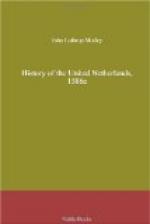Certainly the selection of Leicester to fill so important a post had not been a very fortunate one; and the enthusiasm which had greeted him, “as if he had been a Messiah,” on his arrival, had very rapidly dwindled away, as his personal character became known. The leading politicians of the country had already been aware of the error which they had committed in clothing with almost sovereign powers the delegate of one who had refused the sovereignty. They, were too adroit to neglect the opportunity, which her Majesty’s anger offered them, of repairing what they considered their blunder. When at last the quarrel, which looked so much like a lovers’ quarrel, between Elizabeth and ‘Sweet Robin,’ had been appeased to the satisfaction of Robin, his royal mistress became more angry with the States for circumscribing than she had before been for their exaggeration of his authority. Hence the implacable hatred of Leicester to Paul Buys and Barneveld.
Those two statesmen, for eloquence, learning, readiness, administrative faculty, surpassed by few who have ever wielded the destinies of free commonwealths, were fully equal to the task thrown upon their hands by the progress of events. That task was no slight one, for it was to the leading statesmen of Holland and England, sustained by the indomitable resistance to despotism almost universal in the English and Dutch nations, that the liberty of Europe was entrusted at that, momentous epoch. Whether united under one crown, as the Netherlands ardently desired, or closely allied for aggression and defence, the two peoples were bound indissolubly together. The clouds were rolling up from the fatal south, blacker and more portentous than ever; the artificial equilibrium of forces, by which the fate of France was kept in suspense, was obviously growing every day more uncertain; but the prolonged and awful interval before the tempest should burst over the lands of freedom and Protestantism, gave at least time for the prudent to prepare. The Armada was growing every day in the ports of Spain and Portugal, and Walsingham doubted, as little as did Buys or Barneveld, toward what shores that invasion was to be directed. England was to be conquered in order that the rebellious Netherlands might be reduced; and ‘Mucio’ was to be let slip upon the unhappy Henry III. so soon as it was thought probable that the Bearnese and the Valois had sufficiently exhausted each other. Philip was to reign in Paris, Amsterdam, London, and Edinburgh, without stirring from the Escorial. An excellent programme, had there not been some English gentlemen, some subtle secretaries of state, some Devonshire skippers, some Dutch advocates and merchants, some Zeeland fly-boatsmen, and six million men, women, and children, on the two sides of the North Sea, who had the power of expressing their thoughts rather bluntly than otherwise, in different dialects of old Anglo-Saxon speech.




